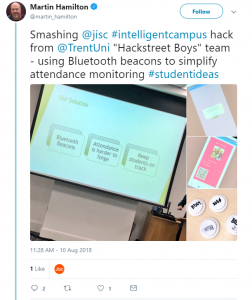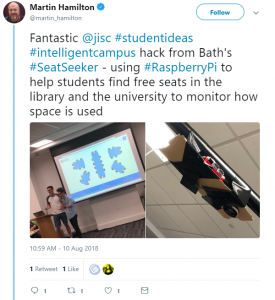Jisc is a membership organisation which provides digital solutions for UK education and research. Jisc provides us with Janet, the high-speed University internet connection – and they help us maintain a focus on the potential future needs of students, researchers and staff.
As part of this, every summer, Jisc invites teams of students from across the UK to take part in innovation activities focused on one or two key themes.
This year, the themes were ‘Intelligent Campus’ – making the campus smarter – and ‘Edtech’ – improving education, research and student life. The venue was Aston University; twelve teams of students from Universities across the country gathered for a five day hackathon, looking at the chosen themes.
Representatives from IT Services – including Business Partnering and Innovation – and Estates attended on day four of the hackathon, to find out what ideas the student teams were developing. We also talked to our Jisc colleagues about their roadmap for the Intelligent Campus and Edtech agendas, and how the University of Birmingham (UoB) can stay connected to the ongoing developments.
Intelligent campus
With the onset of smart living and working, students could really benefit from rooms, lecture theatres and study spaces being made smarter.
Five of the teams of students were tasked with finding solutions, using a range of technology including Raspberry Pis, NFC readers, camera modules and sensors – and an endless supply of caffeine to power the software development.
Two of the solutions were highly relevant to challenges we face here at UoB – recording attendance at lectures accurately, and enabling students to find seats in shared study spaces such as the Library.
Intelistudent: Attendance recording

Team name
The Hackstreet Boys – Nottingham Trent University
The problem
Currently, there are several issues with accurately recording student attendance at lectures.
The challenge
Find a way of capturing attendance data to ensure that attendance is recorded accurately.
The solution
Using Bluetooth beacons to verify a student’s physical presence in a given lecture theatre with an accompanying mobile app. The app measured the proximity to one or more sensors to verify the student’s actual presence, and confirmed back to the students that their attendance had successfully been recorded. Follow Martin Hamilton of Jisc’s Twitter feed here – or view the Hackstreet Boys’ pitch here.
Beyond attendance capture, the team discussed how beacon technology could be extended to capture anonymous information about the number of students in given locations, which would be useful when planning space initiatives and campus development.
Seat Seeker: Enabling students to find seats in shared study spaces

Team name
Team Alpha – University of Bath
The problem
Shared study spaces such as the library appear to be full at peak revision times – when in reality there are spaces dotted around.
The challenge
Find a way of identifying free spaces and making them visible to students
The solution
Using a Raspberry Pi with a special wide-view lens camera positioned above a bank of desks – inexpensive technology – they were able to identify whether a seat was occupied or not, by detecting movement. They displayed this on a web dashboard, so you could see available desks indicated by a green dot, and a summary of the total available space in a location. They also created a staff view, to inform space-planning decisions, which showed the total utilisation of a space in a given timeframe using a heat-map style graphic. Follow Martin Hamilton of Jisc’s Twitter feed here – or view Team Alpha’s pitch here.
This is a familiar concept at UoB – here, we are already trialling occupancy sensors to help students to identify available study space.
We were very impressed with the maturity of Team Alpha’s concept solution – and the Jisc judging panel agreed, as this team ended the week as winners of the £1,000 Intelligent Campus Hackathon prize.
Other ideas developed throughout the week included:
- Augmented reality navigation through a library to find a specific book
- Gesture control for lecturers to control electronic resources in a lecture
- A student engagement app allowing Q&A and feedback in lectures
Edtech
The other seven teams of students – who had previously won a Jisc student ideas competition – were taking part in a five day design sprint to further explore and develop their ideas and products. These ideas included:
- Citation Gecko – allowing a user to follow linked citations between papers and explore a research topic in more detail
- Authorencity – a tool which learns a student’s writing style and can then detect if a paper may have been purchased or outsourced
- App to the Future – an app which aims to be the TripAdvisor for Higher Education work experience and apprenticeships, allowing a prospective student to find an educational path suited to their desired career
- Higherarchy – a collaborative canvas allowing students to mind-map together and share resources
More information on these ideas and projects can be found on Jisc’s Edtech Launchpad page.
Questions?
If you have any queries, or would like to know more about how the University, and more specifically IT Services, can stay connected with these technologies via Jisc, please contact IT Business Partnering.

1 thought on “Making the campus smarter: The Jisc Intelligent Campus Hackathon”